Human Rights Hub
Human Rights Hub Opening Event with the German Minister of Justice
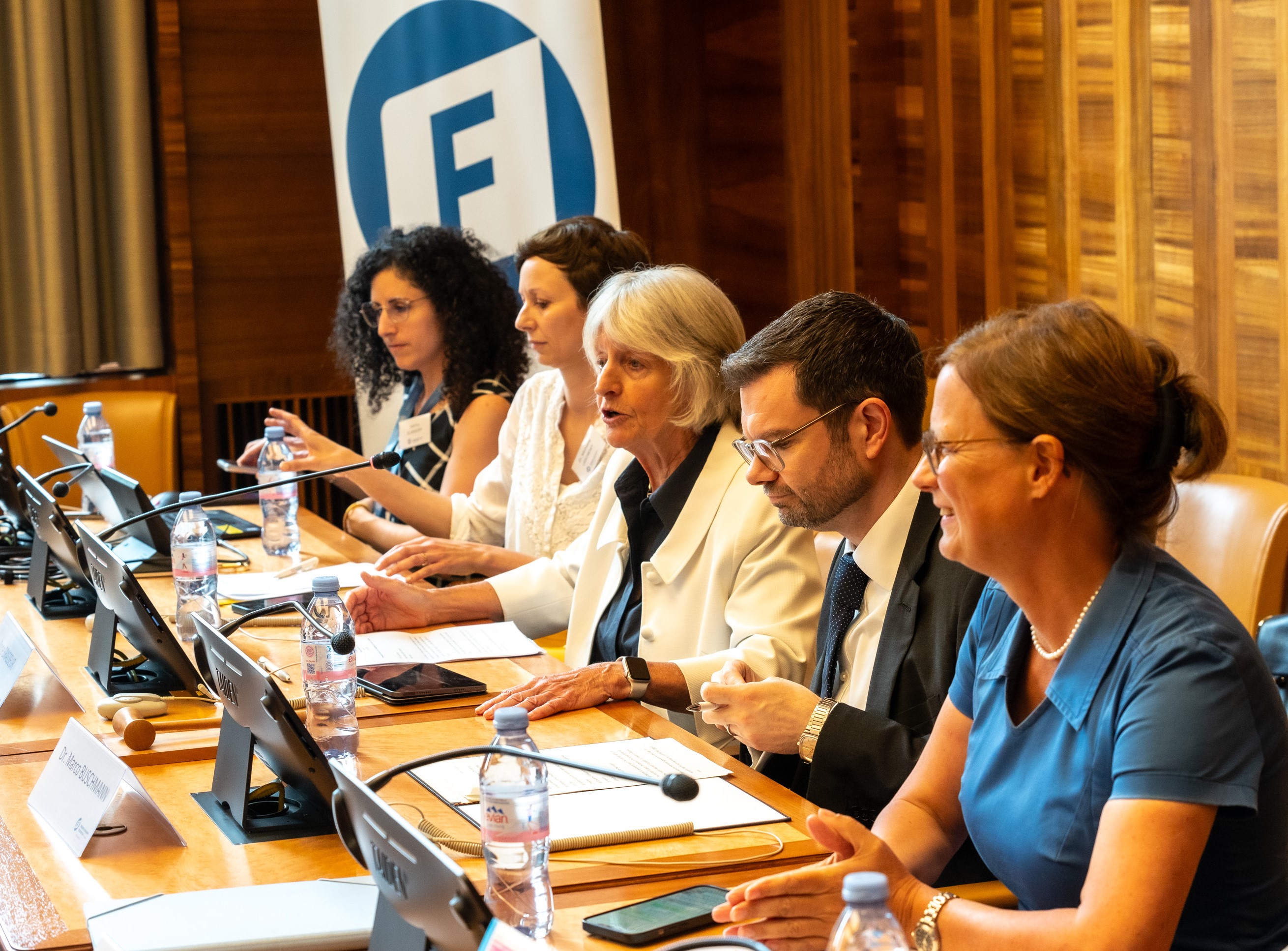
The Friedrich Naumann Foundation opens its Human Rights Hub in Geneva.
© Pierre-Michel VirotOn July 10th, 2024, the Friedrich Naumann Foundation celebrated the inauguration of its Human Rights Hub in Geneva. At the heart of the Palais des Nations, the historic home of the United Nations in Geneva, the opening event brought together ambassadors, friends and partners of FNF to promote the rule of law as a core strategy to strengthen the agenda for freedom.
Anne Brasseur, Chairperson of the Human Rights Hub and Board Member of FNF, welcomed attending guests and provided opening remarks. Noting the rise of extreme right-wing governments and the cautiously hopeful results from France, she asserted
The work of human rights activists and defenders is more necessary than ever.
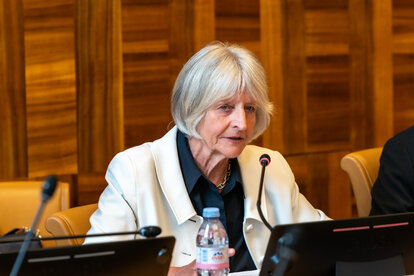
Anne Brasseur, Chairperson of the Human Rights Hub and Board Member of FNF.
© Pierre-Michel VirotAs a liberal foundation working around the world to defend and promote human rights, the vision of the Hub is to motivate and enable our network, promote the work of our partners through supporting their visibility at the international level and enabling experience and capacity sharing among each other.
The Hub was also honored, and humbled, to receive Dr. Marco Buschmann, the German Minister of Justice, to provide the keynote speech.
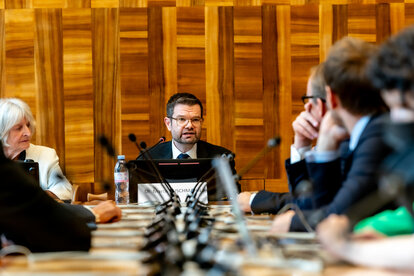
Dr Marco Buschmann during his keynote speech.
© Pierre-Michel VirotReaffirming Germany’s commitment to the international human rights law framework, the Minister congratulated FNF on the opening of the Hub, while putting into context its timely relevance. It has to exist because human rights are increasingly coming under pressure – being questioned, ignored and violated. Human rights don’t protect western culture: they protect fundamental human needs – regardless of culture, religion or state organisation, emphasized the Minister in his key note speech.
Joining the panel, Fadzayi Mahere shared her testimony of being a lawyer for justice and human rights in Zimbabwe.
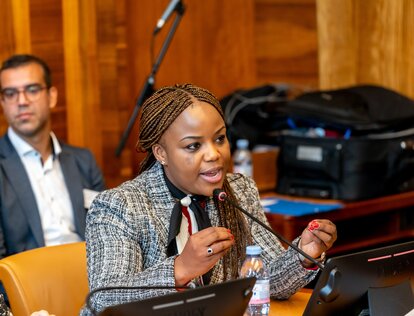
The lawyer and human rights defender Fadzayi Mahere.
© Pierre-Michel VirotThe conversation, moderated by Dr. Michaela Lissowsky, Director of the Hub, centered around the necessity to continuously support justice actors and their clients, often victims of human rights violations and state capture of the judiciary. Noting how autocratic governments have shared techniques and methods to infringe on the rights of their citizens, the call of Advocate Mahere to join forces was a strong argument in favor of creating and consolidating spaces such as the Hub’s office in Geneva.
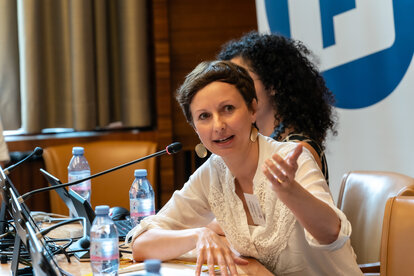
Dr Michaela Lissowsky, Head of the Human Rights Hub.
© Pierre-Michel VirotPathways to justice can also extend beyond national systems or regional and international ones. Dr. Lissowsky and Judge Stefan Waespi, from the Special Court in the Central African Republic (CAR), discussed the emergence of hybrid mechanisms, courts supported by national systems and their international counterparts, as a means to achieve transitional justice. Judge Waespi explained the requirements that ensure the existence of the court and the impact on transitional justice in the country. The example of the Special Court in CAR should be seen as a role model.
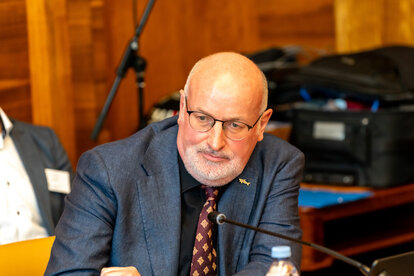
Judge Stefan Waespi, from the Special Court in the Central African Republic (CAR).
© Pierre-Michel VirotThe German Ambassador Dr. Katharina Stasch at the UN in Geneva concluded the panel by commending the Foundation on opening the Hub and underscoring the support of the Permanent Mission of Germany.
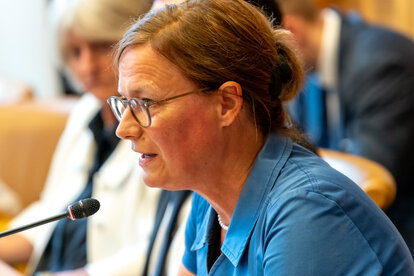
The German Ambassador Dr. Katharina Stasch.
© Pierre-Michel VirotThe Ambassador gave the audience an overview of the work of the Mission during the current Human Rights Council’s 56th session, especially the expectation of a new resolution on matters pertaining to the independence of judges and lawyers. The Ambassador lastly said that while it is always a positive matter to see more German actors in Geneva, it is also an indication of the worsening human rights situation in the world.
Professor Ludwig Heuss, Chairperson of the Board of Trustees, eventually inaugurated the Human Rights Hub.
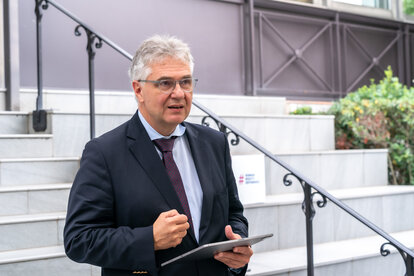
Professor Ludwig Heuss, Chairperson of the Board of Trustees.
© Pierre-Michel VirotAs we enter a more uncertain time, those who violate and threaten human rights are becoming bolder and more united. Fundamental freedoms are increasingly under threat and authoritarianism is rising. In response, there is an urgent need for increased unity and solidarity amongst human rights defenders and champions of the rule of law across the world. The respect for basic human dignity is non-negotiable.
